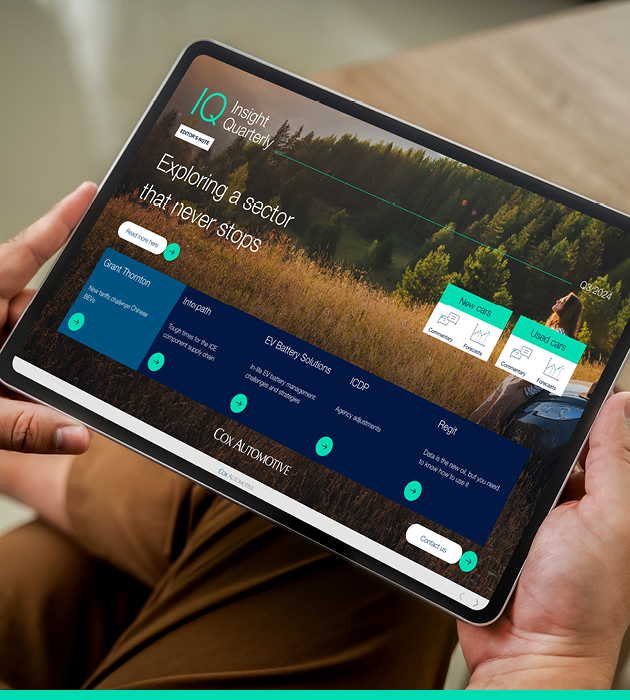Helping you stay informed about the industry’s most important trends & topics.
Discover Insight Quarterly.
Automotive retailers are advised to employ a strategy of ‘focus and grip’ as they navigate challenging economic times.
In the latest issue of AutoFocus, Cox Automotive’s quarterly insight roundup produced in collaboration with Grant Thornton, it explains the current economic climate for automotive retailers against the backdrop of the cost-of-living crisis. While demand for vehicles may reduce, the organisations believe the sector can navigate the ongoing headwinds by focusing more on gross profit and tightening its grip on expenditure.
Philip Nothard, Insight and Strategy Director at Cox Automotive, explained: “At the start of the pandemic, our focus was on identifying the practical steps businesses could take amid deteriorating economic conditions. Our thoughts remain the same. We still advocate that companies should employ a strategy of ‘focus and grip’. Consumer confidence has weakened, which led us to downgrade our new and used forecasts for the year. However, the sector has survived challenging times and is well positioned to get through this sticky period.”
Confidence knocked as inflationary pressures intensify
The impact of the Covid-19 pandemic, Brexit, and growing pessimism towards the outlook for the UK economy all undermine consumer confidence in the domestic market, not helped by the current cost of living crisis. In addition, the energy price cap could rise to over £4,200 in January 2023, putting further pressure on household finances.
As the chart below shows, inflationary pressures have intensified, with annualised consumer price inflation reaching 9.1% in May 2022. As inflation increases, so does the cost of goods and services, reducing purchasing power; these impacts purchasing habits as people adjust their spending habits in response.

Source: United Kingdom Inflation Rate - May 2022 Data - 1989-2021 Historical - June Forecast (tradingeconomics.com)
Owen Edwards, Head of Downstream Automotive, Grant Thornton UK LLP, explained: “The Bank of England (BoE) has indicated that inflation could rise as high as 13% in the coming quarters; if this is the case, the average UK consumer will feel poorer in the future than they feel now unless wages increase at a faster rate. This is unlikely to happen: wage inflation only reached 4.2% from February to April 2022[1] , and pay fell by 2.2% in real terms. As higher inflation outstrips wage growth, the average consumer will have less money to spend and feel less confident in spending their money.”
A stagflationary environment
Writing in Autofocus, Grant Thornton suggests the UK is heading towards a state of stagflation, in which the inflation rate is high or increasing, the economic growth rate slows, and unemployment remains stubbornly high. This presents a dilemma for economic policy since measures intended to lower inflation may exacerbate unemployment.
Owen Edwards explained: “While unemployment levels are currently low, inflationary pressures combined with a slowing economy will force companies to take steps to maintain their profitability. As a result, businesses will likely face the prospect of cutting their wage bills amid weakening consumer demand. In addition, the BoE has already forecast an increase in unemployment that will, in turn, further dent consumer confidence.”
The Bank of England is looking to control inflation and ultimately return it towards its 2% target, and further increases in interest rates are widely expected over the coming months, with comments from the BoE and other sources suggesting that rates could exceed 3% (as of 16th June 2022).
“Higher interest rates mean consumers will feel less optimistic about how much money they have to spend,” added Edwards. “Borrowing costs – including mortgages and credit cards – will rise, and the future cost of automotive finance is also set to increase if the cost of borrowing is linked to the BoE base rate.”
The contributing factors have led Cox Automotive and Grant Thornton to downgrade their outlook for the new and used vehicle markets to reflect a dip in consumer confidence and lower available spending. However, the organisations insist that automotive retailers can ride the storm with a strategy of focus and grip.
Cash is a lifeline
Within Autofocus, Cox Automotive and Grant Thornton share tips to help retailers focus their profit and tighten their expenditure grip. This includes maximising gross profits, reviewing current overheads to identify possible savings, and minimising the level of working capital to ensure stock turn is as high as possible.
Philip Nothard concluded: “Cash is the lifeblood of any business, and by reviewing cash flow and available funds every month, companies will stay in good shape during this tricky financial period. Our advice is to re-examine the basics when it comes to managing your business. These may have slipped in the changing environment as we have all been focusing on finding new and used vehicles and enjoying healthy profit margins. Vehicle shortages will remain for some time; nevertheless, rising overheads in automotive retail companies are also here to stay.”
To read more in AutoFocus, click here.
Start your journey
We’re transforming the operations of the world’s leading automotive brands. Get in touch to find out how.




